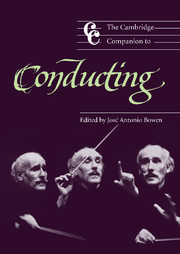6 - Opera conducting
from Part I - Practice
Published online by Cambridge University Press: 28 September 2011
Summary
A good orchestra, fully trained, will be able to play most symphonic works of the classical period without any conductor at all. It might not have the stamp or the personality of an enlightened musician on it, but the performance would not actually come to a halt. However, an opera cannot even begin to be performed without a proper conductor directing the whole proceedings. It has always been a great mystery to me how complicated passages like, say, the second finale of Così fan tutte, or many scenes in Idomeneo, could have been done without a baton-waving conductor. But of course, it may not have been all that well together in those days. As Mozart said himself of the first performance of Don Giovanni, “a lot of notes fell under the desks.”
There is, therefore, a feeling among orchestras that, although they do not really admire symphony conductors so much, they have a grudging respect for opera conductors, because they realize that opera conducting is so much more difficult and complicated. The general suspicion that orchestra players have of conductors is a great deal more prevalent in the concert hall than in the opera house, where the smallest mistake can show up the conductor.
- Type
- Chapter
- Information
- The Cambridge Companion to Conducting , pp. 65 - 78Publisher: Cambridge University PressPrint publication year: 2003
- 1
- Cited by

